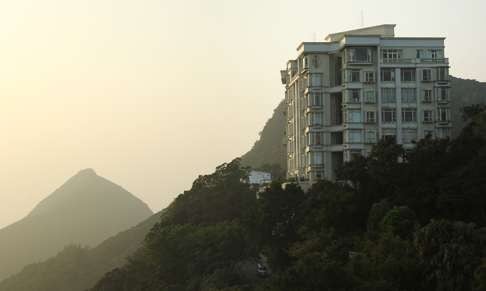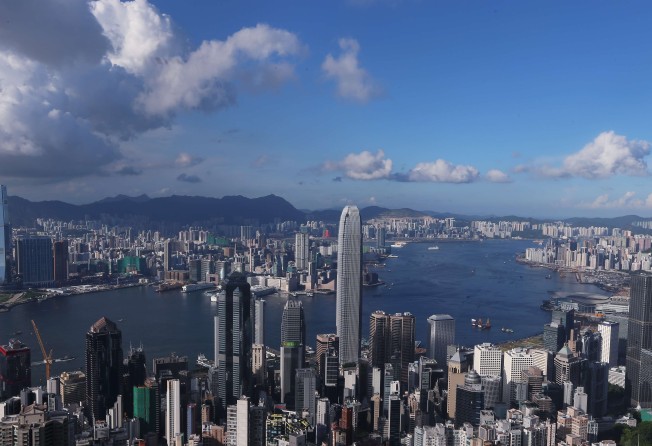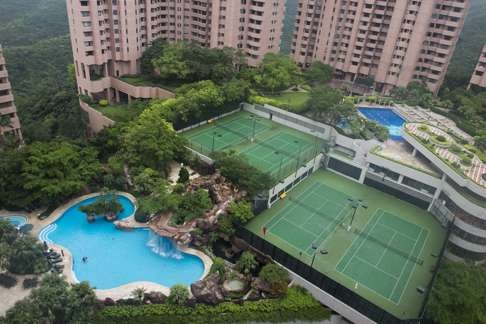
Hong Kong expat bankers downsize drastically as housing allowances shrivel
Luxury rental market takes a hit with expats working in finance swapping HK$300,000-a-month flats with killer views for HK$80,000 places, and other expats on rental budgets of less than HK$30,000

Long the golden privilege of the Hong Kong-based finance and banking crowd in Asia, the days of guaranteed housing allowances fat enough to rent a 4,000 sq ft harbour-view home on The Peak or a townhouse in exclusive Repulse Bay for HK$300,000 a month are gone.
That perk is being slashed or eliminated, forcing expatriates working in finance to give up marble Jacuzzis, private gardens and killer views in exchange for something more humble. And it’s putting a damper on the luxury rental market.
“We are seeing more downsizing,” said Maureen Mills, managing director of Executive Homes Hong Kong, a boutique real estate agency that works with law firms. “Partners used to have company leases and were happy to spend HK$150,000. Now with cash packages they are more comfortable at HK$80,000 to HK$100,000.”
In the first quarter of this year, only 7 per cent of Jones Lang LaSalle’s expat real estate clients in Hong Kong were given monthly rental budgets of more than HK$100,000, down from 31 per cent in 2012. Now, 54 per cent of clients make do with less than HK$30,000 a month,―enough for about two small bedrooms squished into 550 square feet in Central district―compared with 11 per cent four years ago.

The downsizing trend is occurring against the backdrop of Hong Kong’s biggest property correction since the Sars epidemic of 2003. After climbing 370 per cent until their September peak, housing prices have since fallen about 14 per cent. Analysts are predicting further declines of as much as 25 per cent this year, which in turn will affect rents as leases come up for renewal.
Five years ago, when expat housing allowances were paid on a “use it or lose it” basis, agents had plenty of clients willing to spend as much as HK$300,000 a month. Now company-paid leases are out, and while salaries are adjusted to partially offset the missing housing allowances, employees no longer have an incentive to spend a king’s ransom on rent. Now they are more likely to content themselves with a two-bedroom, 1,320 sq ft apartment at Hong Kong Parkview above Happy Valley for HK$88,000 a month.
“It’s humbling times,” said Joanne Lee, associate director of research and advisory for Hong Kong at property agency Colliers International Group.

Even on reduced budgets, expats still enjoy a lifestyle beyond the wildest imagination of the rest of the Hong Kong population, whose average monthly household income is about HK$24,800. About 46 per cent of people live in public housing, and the city has the least affordable housing market in the world, according to the annual Demographia International Housing Affordability Survey.
“There has been an effect,” said Irene Lee, chairman of Hysan Development, which leases out flats at the luxury Mid-Levels development Bamboo Grove, where rents start at HK$35,000 for a one-bedroom apartment. “There is a decline in the number of expats and in their packages.”
Worst affected are high-end properties like The Mount Austin atop Victoria Peak. A few years ago, landlord Nan Fung Development had no trouble finding expats willing to shell out HK$280,000 a month for a 3,787 sq ft duplex. Today, however, property agents say they’re lucky to even get interest, let alone find tenants. It’s the same at Cheuk Nang Lookout, whose 3,362 square feet in Severn Road on The Peak come with a monthly asking price of HK$320,000. The apartment boasts a marble Jacuzzi, three terraces and a garden. It’s been vacant for two years.
“People cannot afford to pay so much any more,” said Walker Lam, director of the Hong Kong market at Landscope Christie’s International Real Estate.
After more than a decade of steady rental increases, luxury landlords are now looking at reductions of as much as 30 per cent for properties at the very top of the market, Lam said. Some developers are also quietly providing other inducements, such as a month free.
It’s increasingly common for companies to replace expat packages with quasi-local ones that include a subsidy for housing. These “permanent transfer” relocations for a middle manager position might include HK$30,000 for a single person and HK$70,000 for a family, said Lee Quane, regional director at human resources consultancy ECA International.
To be sure, some top non-banking international executives still arrive in Hong Kong on full expat packages with housing allowances as high as HK$300,000, paid tuition for their children’s schools, and guaranteed repatriation after two or three years. Those include executives working for international fashion houses and global multinational corporations.
“You do see downsizing, but houses on The Peak still have people,” said Harry O’Neill, partner in the chief executive officer and board practice at recruitment firm Heidrick & Struggles International.
“They just aren’t bankers.”